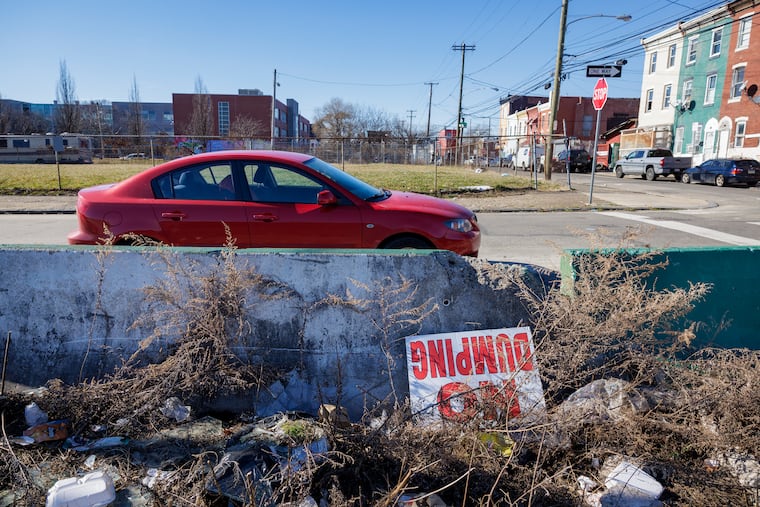Mayor Parker’s $246 million plan to clean up ‘Filthadelphia’
The proposal includes an $11 million pilot for twice weekly trash pickup, 1,500 more “Big Belly” trash cans, crews to tackle illegal dumping, and a plan to seal 900 vacant buildings.

Philadelphia Mayor Cherelle L. Parker ran on making the city “cleaner and greener” — and her inaugural budget includes $246 million investment over five years in initiatives aimed at delivering that promise.
“When residents see overflowing trash cans, short-dumping sites that pile back up days after being cleared; cars forgotten and abandoned, then you understand why some folks don’t believe their neighborhoods will ever be clean,” Parker said during her budget address to City Council on Thursday. “Let’s banish the phrase ‘Filthadelphia’ once and for all.”
Parker outlined a complex patchwork of initiatives. These include an $11 million pilot for twice weekly trash pickup in certain neighborhoods, 1,500 more “Big Belly” style trash cans, new crews for each Council district to tackle illegal dumping, a plan to seal 900 vacant buildings, and a promise to haul away 10,000 abandoned cars.
But nearly half of the overall investment would dramatically expand an existing initiative — $130 million over five years to supercharge Parker’s own “Taking Care of Business” program, or TCB, which previously focused on cleaning commercial corridors.
The $10 million a year program was created by then-council member Parker in 2019, and is funded through the city’s Commerce Department. That department issues grants to local nonprofits, which in turn contract with private cleaning providers to manually clean streets and sidewalks along 85 different areas scattered across the city.
Parker’s new budget would expand the program to cover 140 commercial zones citywide. Budget documents also describe plans to clean residential streets adjacent to commercial areas either through TCB or companion programs run through the city’s municipal Sanitation department.
Parker has also pitched these grants as a workforce tool, with some private contractors drawing cleanup crew workers from formerly homeless or incarcerated men and women, who earn at least $15 an hour. She likened her expansion plan to the added cleaning services provided in downtown areas by groups like the Center City District, an economic development agency funded by businesses.
“Our neighborhoods deserve the same level of care and cleanliness,” she said.
Philadelphia has long been one of the only big cities lacking a comprehensive citywide cleaning program, and Parker said her proposed efforts would eventually “touch every neighborhood” in the city. The administration did not respond to questions Thursday seeking specific details about the implementation of this program.
The city has long has a reputation for trash.
Pamela Woods, 54, said her neighborhood — West Philadelphia near 52nd Street — desperately needed to be cleaned up.
“It’s horrible,” she said. “People just don’t care where they throw trash at. You got the kids walking around and they finding needles everywhere.”
Woods, who’s lived in the neighborhood since the 1970s, said she was concerned about more than trash, though. “How about fixing the libraries and cleaning up the playgrounds so the kids have a place to play?”
Still, she said, “the city needs a lot of cleaning. A lot.”
Under the current version of TCB, grants have flowed to nonprofits across the city. The Impact CDC, for example, receives $400,000 to regularly clean hard hit Kensington Avenue. The Enon Coulter CDC, a nonprofit run by the Enon Tabernacle Church, which Parker attends, receives $715,150 to clean areas in the mayor’s home neighborhood of West Oak Lane.
Parker’s various cleaning proposal will ultimately span several city departments, and would be folded under the aegis of a recently created Office of Clean and Green Initiatives. The office is led by former Streets Department director Carlton Williams.
Former Mayor Jim Kenney’s administration studied litter removal strategies for years, and ultimately launched a street cleaning pilot through the Streets Department that saw traditional sweeping trucks deployed to several zones across Philadelphia. The aim was to eventually expand these efforts citywide.
Parker’s larger budget would also invest in the Streets department, which she said would “complement” the TCB efforts. The new budget includes funds for 100 new sanitation workers and 60 new trash compactor trucks, and does call for expansions to the Kenney-era sweeping program.
A budget document outlining this plan was also light on specifics, stating only that it would focus on adding sweeping to “areas where a significant need exists, as well as cleaning for a greater number of streets in the city at least once during the year.”
Brent Cebul, a University of Pennsylvania history professor who recently wrote a book on public-private partnerships, questioned why the city was not channeling more of street cleaning funds through its own Sanitation Department.
He said diffusing sanitation funds across dozens of small nonprofits or private subcontractors would politicize the provision of street cleaning services and make public oversight more difficult.
“Deciding which nonprofits get these contracts will become a political process,” he said. “And it makes it really difficult for citizens to trace all this funding out. … The city government isn’t efficient in a lot of ways, but at least that inefficiency is clear and accountable.”
Staff writers Juliana Feliciano Reyes and Anna Orso contributed to this article.